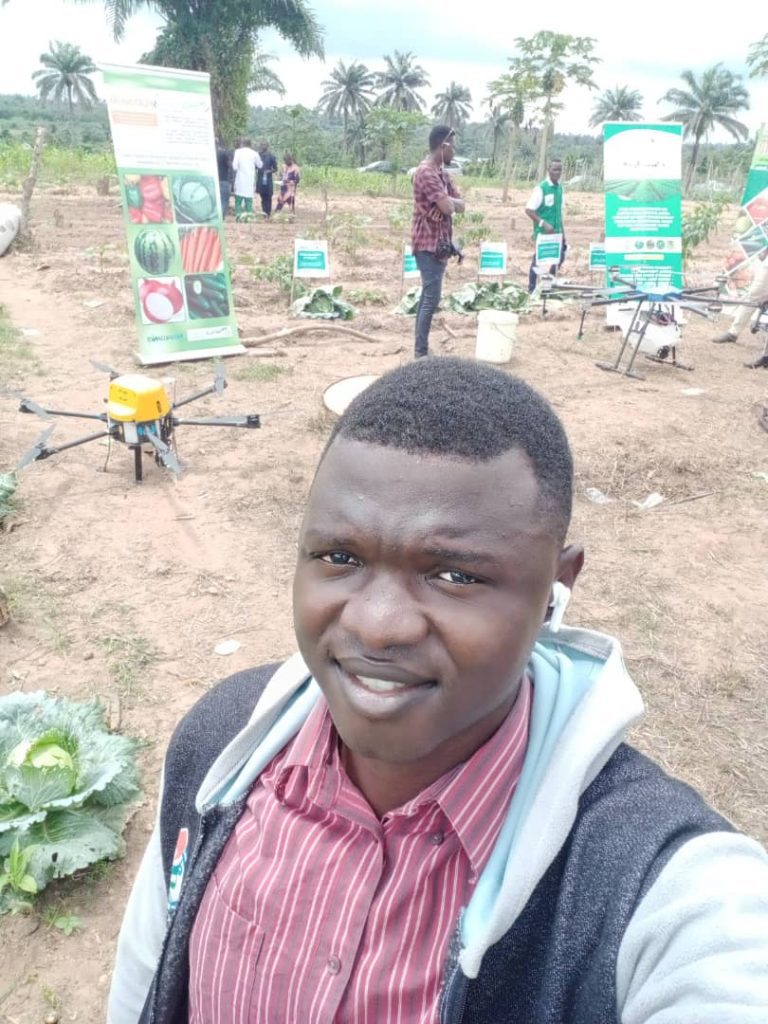Mr. Joshua Peter, the sack farmer on a farmsite for assessment.
In a stark warning to consumers, who participated in a virtual sack farming training organised by him, Joshua Peter, an expert sack farming trainer, has said there is an impending severe surge in food costs, if more people do not practice farming. Presenting sack farming as having a huge potential to mitigate the potential consequences and predictions of rising food cost, Joshua gave insights into practising successful farming even at home and in urban cities.
The young and visionary farmer, Joshua Peter, has turned to innovative methods to educate and inspire fellow citizens to do sack farming by planting five kinds of food, ranging from grains, tuber, leafy vegetables, fruit vegetables and ornamentals. Through the use of Telegram, an instant messaging platform, this dedicated farmer has urged participants to, not only grow what they eat, but also contribute to ensuring food security on a national scale.
Homegrown tomato plants sown in sacks.
“I once set up 100 tomato plants in sacks for a large family of around 15 adults. They didn’t buy tomatoes for two and half months. I also planted 66 tomato stands for myself. At some point, we had to start gifting neighbours with tomatoes when harvest began, because tomatoes were literarily everywhere”, Joshua testified on the virtual community. Amid growing concerns about food security and the need for sustainable agricultural practices, Peter, a passionate farmer residing and farming in Ibadan, Oyo State, Nigeria, has taken a unique approach to freely empower individuals and households with the knowledge and skills needed to cultivate their own food using soils stored in sacks. The focal point of this initiative is sack farming, a space-efficient and resource-effective method of growing crops in sacks or containers.
Telegram, a widely used messaging app, serves as the central hub for Joshua’s efforts. The platform allows him to connect with diverse and hundreds of people by sharing valuable insights, guidance, and resources related to sack farming. By leveraging this technology, he has successfully created a virtual community of like-minded individuals, who are eager to embark on this agricultural journey. Speaking with FarmingFarmersFarms, Joshua said he believes that empowering individuals to grow their own food not only ensures their self-sufficiency, but also contributes to a larger goal by achieving food security at the national level. He emphasises the importance of each citizen’s role in reducing the country’s reliance on food imports and promoting sustainable agricultural ecosystem. He also noted that the incidence of farm diseases would reduce if people grow their food, especially veggies and pepper freshly. He pointed out that the attendees could use clean cement sack, or chicken feed sack, to do their sack farming, either in their backyards or parking lots; as long as there is enough sunlight and no shadow in the area.
Homegrown tomato plants.
The Telegram group, aptly named ‘Sack Farming Tutorial’, had attracted hundreds of participants from various regions of the country. Members of the group shared their progress, exchanged tips and tricks, and learned, from not just the organiser’s expertise; but from other experienced farmers, who also attended the virtual training. This virtual community, according to some of the participants, had become a source of motivation for participants to cultivate a wide range of crops in sacks, from leafy greens to root vegetables. In addition to providing knowledge and guidance, Joshua is also organising virtual consultancy for those who want to set up, webinars, and questions and answers sessions to address specific needs and challenges of group members. These interactive sessions have proven to be invaluable in helping participants overcome obstacles and maximise their yields.
According to him, his purpose for organising the training had to do with his envisioning a future where every citizen has the ability to contribute to the nation’s attainment of food security. He reiterated how that people can grow some food at home without having a farmland or access to land, even if their compound is cemented or tiled. He firmly believes that sack farming, with its low cost, minimal space requirements, and sustainability benefits, is a practical and achievable solution. By harnessing the power of technology and social media platforms like Telegram, he hopes to inspire a new generation of farmers and food enthusiasts. Among the attendees, is “Tor Legacy”, who narrated how that he had been doing successful sack farming for over two years, planting tomatoes, yam, peppers, curry leaves, scent leaves, and other vegetables. He, however, shared his challenges with pest attack, especially with tomatoes, which was later addressed. Additionally, participants were taught when and how to apply manure and pesticides.
Homegrown tomato plants sown in sacks behind a duplex compound for a household of 15.
The organiser further used the opportunity to advise all new farmers to always seek expert’s help whenever they want to start any planting. As the demand for locally-grown and sustainable food continues to rise, Joshua’s efforts are not only contributing to individual self-sufficiency, but also fostering a brighter and more secure future for the nation’s food supply. “Food is going to get more expensive; use this knowledge well so you don’t have to spend so much on food later…”, he had charged the participants. His innovative use of Telegram to promote sack farming and food security is a testament to the power of technology in driving positive change in agriculture. In a world where food security is of paramount importance, Joshua’s dedication to teaching others how to grow what they eat serves as a beacon of hope and inspiration for a more resilient and self-sustaining future.


